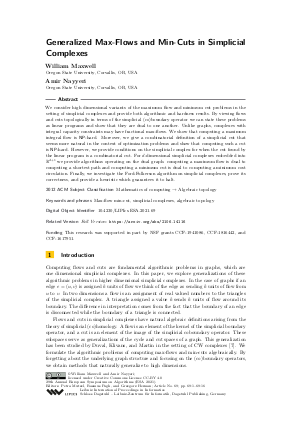Generalized Max-Flows and Min-Cuts in Simplicial Complexes
Authors William Maxwell, Amir Nayyeri
-
Part of:
Volume:
29th Annual European Symposium on Algorithms (ESA 2021)
Part of: Series: Leibniz International Proceedings in Informatics (LIPIcs)
Part of: Conference: European Symposium on Algorithms (ESA) - License:
 Creative Commons Attribution 4.0 International license
Creative Commons Attribution 4.0 International license
- Publication Date: 2021-08-31
File

PDF
LIPIcs.ESA.2021.69.pdf
- Filesize: 0.68 MB
- 16 pages
Document Identifiers
Related Versions
- Full Version https://arxiv.org/abs/2106.14116
Subject Classification
ACM Subject Classification
- Mathematics of computing → Algebraic topology
Keywords
- Max-flow min-cut
- simplicial complexes
- algebraic topology
Metrics
- Access Statistics
-
Total Accesses (updated on a weekly basis)
0Document
0Metadata
Abstract
We consider high dimensional variants of the maximum flow and minimum cut problems in the setting of simplicial complexes and provide both algorithmic and hardness results. By viewing flows and cuts topologically in terms of the simplicial (co)boundary operator we can state these problems as linear programs and show that they are dual to one another. Unlike graphs, complexes with integral capacity constraints may have fractional max-flows. We show that computing a maximum integral flow is NP-hard. Moreover, we give a combinatorial definition of a simplicial cut that seems more natural in the context of optimization problems and show that computing such a cut is NP-hard. However, we provide conditions on the simplicial complex for when the cut found by the linear program is a combinatorial cut. For d-dimensional simplicial complexes embedded into ℝ^{d+1} we provide algorithms operating on the dual graph: computing a maximum flow is dual to computing a shortest path and computing a minimum cut is dual to computing a minimum cost circulation. Finally, we investigate the Ford-Fulkerson algorithm on simplicial complexes, prove its correctness, and provide a heuristic which guarantees it to halt.
Cite As Get BibTex
William Maxwell and Amir Nayyeri. Generalized Max-Flows and Min-Cuts in Simplicial Complexes. In 29th Annual European Symposium on Algorithms (ESA 2021). Leibniz International Proceedings in Informatics (LIPIcs), Volume 204, pp. 69:1-69:16, Schloss Dagstuhl – Leibniz-Zentrum für Informatik (2021)
https://doi.org/10.4230/LIPIcs.ESA.2021.69
BibTex
@InProceedings{maxwell_et_al:LIPIcs.ESA.2021.69,
author = {Maxwell, William and Nayyeri, Amir},
title = {{Generalized Max-Flows and Min-Cuts in Simplicial Complexes}},
booktitle = {29th Annual European Symposium on Algorithms (ESA 2021)},
pages = {69:1--69:16},
series = {Leibniz International Proceedings in Informatics (LIPIcs)},
ISBN = {978-3-95977-204-4},
ISSN = {1868-8969},
year = {2021},
volume = {204},
editor = {Mutzel, Petra and Pagh, Rasmus and Herman, Grzegorz},
publisher = {Schloss Dagstuhl -- Leibniz-Zentrum f{\"u}r Informatik},
address = {Dagstuhl, Germany},
URL = {https://drops.dagstuhl.de/entities/document/10.4230/LIPIcs.ESA.2021.69},
URN = {urn:nbn:de:0030-drops-146509},
doi = {10.4230/LIPIcs.ESA.2021.69},
annote = {Keywords: Max-flow min-cut, simplicial complexes, algebraic topology}
}
Author Details
Funding
This research was supported in part by NSF grants CCF-1941086, CCF-1816442, and CCF-1617951.
References
-
Ravindra K. Ahuja, Thomas L. Magnanti, and James B. Orlin. Network Flows: Theory, Algorithms, and Applications. Prentice-Hall, Inc., USA, 1993.

- Glencora Borradaile and Philip Klein. An O(n log n) algorithm for maximum st-flow in a directed planar graph. J. ACM, 56(2), 2009. URL: https://doi.org/10.1145/1502793.1502798.
-
Erin W. Chambers, Jeff Erickson, and Amir Nayyeri. Minimum cuts and shortest homologous cycles. In Proc. 25th Ann. Symp. Comput. Geom., pages 377-385, 2009.

- Erin W. Chambers, Jeff Erickson, and Amir Nayyeri. Homology flows, cohomology cuts. SIAM Journal on Computing, 41(6):1605-1634, 2012. URL: https://doi.org/10.1137/090766863.
- Tamal K. Dey, Anil N. Hirani, and Bala Krishnamoorthy. Optimal homologous cycles, total unimodularity, and linear programming. SIAM J. Comput., 40(4):1026-1044, 2011. URL: https://doi.org/10.1137/100800245.
-
Tamal K. Dey, Tao Hou, and Sayan Mandal. Computing minimal persistent cycles: Polynomial and hard cases. In Proceedings of the Thirty-First Annual ACM-SIAM Symposium on Discrete Algorithms, SODA '20, page 2587–2606, USA, 2020. Society for Industrial and Applied Mathematics.

-
Art M. Duval, Caroline J. Klivans, and Jeremy L. Martin. Cuts and flows of cell complexes. Journal of Algebraic Combinatorics, 41:969-999, 2015.

- Art M. Duval, Caroline J. Klivans, and Jeremy L. Martin. Simplicial and cellular trees, pages 713-752. Springer International Publishing, Cham, 2016. URL: https://doi.org/10.1007/978-3-319-24298-9_28.
- Jeff Erickson. Algorithms. http://algorithms.wtf, 2019.
-
Jeff Erickson and Amir Nayyeri. Minimum cuts and shortest non-separating cycles via homology covers. In Proc. 22nd Ann. ACM-SIAM Symp. Discrete Algorithms, pages 1166-1176, 2011.

- Arthur F. Veinott, Jr. and George B. Dantzig. Integral extreme points. SIAM Review, 10(3):371-372, July 1968. URL: https://doi.org/10.1137/1010063.
-
Greg N. Frederickson. Fast algorithms for shortest paths in planar graphs with applications. SIAM J. Comput., 16(6):1004-1004, 1987.

-
Refael Hassin. Maximum flow in (s, t) planar networks. Inf. Process. Lett., 13:107, 1981.

-
Refael Hassin and Donald B. Johnson. An O(nlog² n) algorithm for maximum flow in undirected planar networks. SIAM J. Comput., 14(3):612-624, 1985.

- Sergei Ivanov (https://mathoverflow.net/users/4354/sergei ivanov). computational complexity. MathOverflow. URL:https://mathoverflow.net/q/118428 (version: 2013-01-09). URL: http://arxiv.org/abs/https://mathoverflow.net/q/118428.
- Oscar H Ibarra, Shlomo Moran, and Roger Hui. A generalization of the fast LUP matrix decomposition algorithm and applications. Journal of Algorithms, 3(1):45-56, 1982. URL: https://doi.org/10.1016/0196-6774(82)90007-4.
-
Alon Itai and Yossi Shiloach. Maximum flow in planar networks. SIAM J. Comput., 8:135-150, 1979.

-
Giuseppe F. Italiano, Yahav Nussbaum, Piotr Sankowski, and Christian Wulff-Nilsen. Improved algorithms for min cut and max flow in undirected planar graphs. In Proc. 43rd Ann. ACM Symp. Theory Comput., pages 313-322, 2011.

- Fabian Latorre. The maxflow problem and a generalization to simplicial complexes, 2012. URL: http://arxiv.org/abs/arXiv:1212.1406.
-
Lek-Heng Lim. Hodge Laplacians on graphs. SIAM Review, 63(3):685-715, 2020.

- Sarah Morell, Ina Seidel, and Stefan Weltge. Minimum-cost integer circulations in given homology classes, 2020. URL: http://arxiv.org/abs/1911.10912.
-
John Reif. Minimum s-t cut of a planar undirected network in O(nlog² n) time. SIAM J. Comput., 12:71-81, 1983.

-
Alexander Schrijver. Theory of Linear and Integer Programming. John Wiley & Sons, Inc., USA, 1986.

